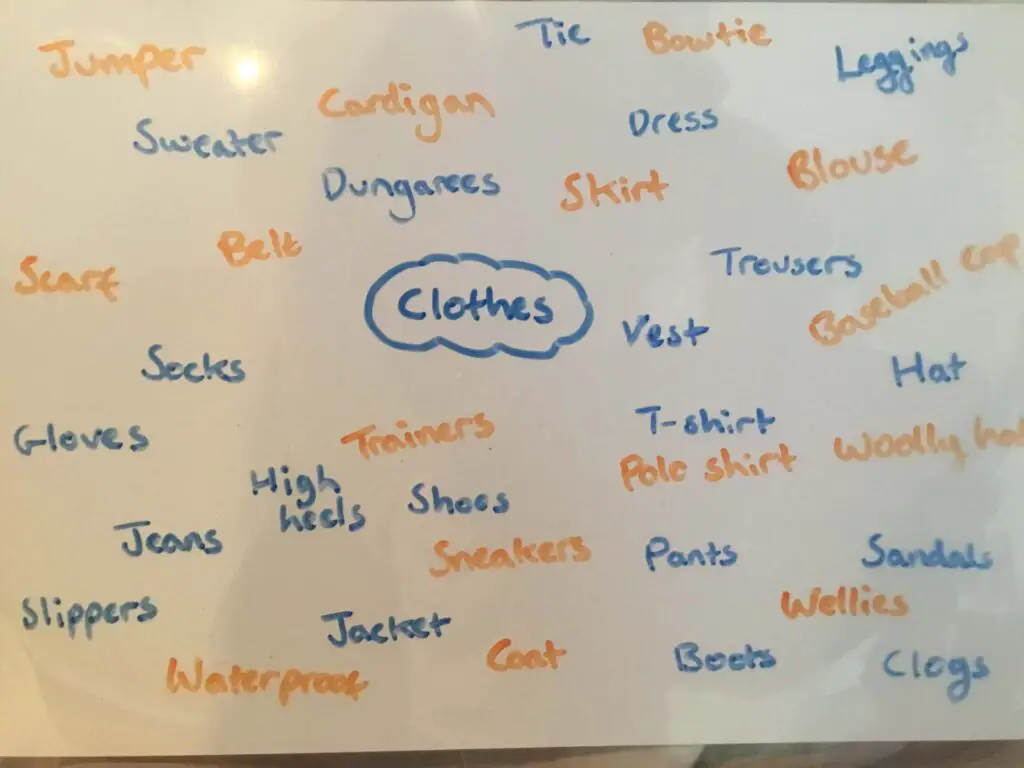Elicitation is a vital skill for EFL/ESL teachers in the modern classroom. I use it in every class, at least to a certain extent, through engaging and encouraging activities.
To elicit vocabulary in EFL/ESL classes, a teacher finds out what words and phrases a student knows about a specific topic without treating it like an assessment. It usually happens in a pressure free environment, with students contributing orally. Pictures, gestures, sounds and descriptions all aid the elicitation process.

Without knowing what words your students already know (and don’t know) it’s difficult to build vocabulary. Great elicitation finds students’ strengths and weaknesses quickly.
Vocabulary elicitation is step 1 of my Best Method to Improve EFL/ESL Students’ Vocabulary, so make sure you check out that guide to see where these techniques fit within the bigger picture.
Key principles to vocab elicitation
According to the Cambridge Dictionary, elicitation is:
“the practice of getting a student to provide or remember a fact, response, etc. rather than telling them the answer.”
Source Cambridge Dictionary
It fits in with a more modern attitude of teaching, which is student led, collaborative, and conversational, instead of the traditional methods of teachers supplying information for students to remember.
And it’s simpler than you think. It can be as basic as asking your students what they know and waiting for them to tell you. However, that might not get you the best results. Often, students don’t really know what they know. They need a little poking and prodding to get the right information out of them. This is where teacher skill comes in.
Most of the skill comes down to knowing your students. If you understand what motivates them to take that extra step and dig deeper into their mind to bring up some information, you can elicit almost anything. Gentle pointers and guidance along the way are helpful too.
Here are some important principles to consider when eliciting vocabulary. I’ll use the example of animals throughout.
Don’t treat it like a test. Although you might use it as a soft assessment to figure out what they know, don’t let them feel they have to get answers right. Mistakes are fine. Don’t make them feel bad because they forgot the word “gerbil”. It should be a no-pressure activity.
Praise more challenging words. Everyone knows “cat” and “dog”, but when someone pipes up with “falcon” or “cheetah”, let them know they’re doing great.

Hints can be helpful, but don’t go too far. Sometimes students just forget something exists, but they could easily remember the word with a quick prompt. For example, if your students don’t come up with “crocodile”, you could mime the snapping jaws. Just don’t give them English clues like “it begins with a c”.
Keep a note of what words arise. This is even better when students can see what they’ve come up with – fill a whiteboard with 50 animal words and marvel at how much they know. You’ll also want to keep a record so you can tailor future teaching. Maybe do another elicitation after teaching some new words to see what they’ve learned.
Pictures, descriptions, sounds and gestures all help. Much of the way we remember words is related to a picture, sound, or movement, so supplying these can help trigger a memory. For animals, you can use cartoons, animal noises, ways of movement (think slithering snake, gorilla beating its chest, etc.)
Students always forgetting vocabulary? You need to read this: Why EFL/ESL Students Forget Vocab: Causes and Solutions
In classes of 5+ students, divide the elicitation. This avoids a situation where a confident minority gives you a load of words they know, but the rest of the class doesn’t. Just because one student knows “duck-billed platypus”, doesn’t mean the others do.
Use elicitation to introduce new vocabulary. The whole point of elicitation is to build on their pre-existing knowledge. If they don’t know the word for something, well, that’s great! They’re going to learn something new! Add the word to the record, but mark it as a new one.
Activities for eliciting vocabulary
Now we’ve got the do’s and don’ts out of the way, let’s have a look at 7 great vocab elicitation activities. These all give opportunities for students to say or write what they already know, but also offer various routes for introducing new vocabulary in a natural, valuable way.
1. Brainstorm
Simple and flexible. Establish the category and have students supply words they already know. Write them on the board, covering all available space, and enjoy creating a massive resource together.
This is appropriate for small and large classes. If you want to keep things calm, make sure students are putting their hands up. For a bit more energy, have students shout out words while you try to write them down quickly (best for smaller groups!).
If students give advanced words which you suspect not everybody knows, have that student explain the meaning to their peers. When ideas dry up, write a few words of your own (maybe ones from a list you’re required to teach) and give definitions if students don’t know what they mean. You can mark these new/advanced words for future practice.
What I like best about this activity is there’s minimal setup, everyone knows how it works, and you have an end product. Take a photo to store the valuable information you’ve gained. Here’s a photo I took of a brainstorm I did with a class about clothes.

And don’t rub it out yet – you can use that board for a vocabulary game later in the class!
2. Packed pictures
This involves using a picture packed full of activity like those novelty jigsaws or books in which you have to find a character, like Where’s Wally/Waldo.
For a student-led session, let them explore the picture and find unique things. Make it competitive by challenging them to find as many things as possible (regardless of if they know the word or not).
If you have more specific vocab targets, point out certain objects as you explore the picture with them.
These pictures are versatile, and children love them. As I don’t own any of the pictures, I can’t post them here, but searching “crazy novelty jigsaw” on Google Images will bring up some examples. I prefer the ones with a mix of both objects and people, but it really depends on the needs of your class.
3. Reading for vocabulary
Reading activities can bore students, but if you set clear goals, they can become quite enjoyable.

You can kick off a reading session with a vocab elicitation. Make it a challenge – students have to find the 5 most difficult words they understand, and 5 words they don’t know.
If you have more specific vocabulary targets, highlight key words beforehand and have students categorise them as “know” or “don’t know”.
Then have them explain to you the words they claim they know, and in return, you tell them the meaning of the ones they don’t know.
Often, context sheds light on different meanings for a single word. This is a great opportunity to discover secondary uses and phrasal verbs. A student might understand “put” and “off”, but “put off” means something totally different.
4. Go on a word hunt
This is my favourite elicitation technique. It’s limited by your location, but creates the most powerful connections.
It’s simple. Take your students on a trip around the classroom/house/school or wherever you can. When you’re there, have students name things they see. When they can’t find a word, take a photo of the thing and write the word down to keep a record.
As long as their parents are okay with it, I like students to get in the photo as this creates a personal link – another valuable vocab learning technique.

This works best with small groups, especially when you’re teaching children. However, if you have a bigger class and trust them with a camera/phone, let them go out in groups and challenge them to take photos of 10 things they know, and 10 things they don’t. Later, each group can share with the rest of the class.
5. Videos and songs
Listening to people speaking or singing English works similarly to the reading activity at number 3 on this list.
In these types of activities, students tend to drift off and not pay attention, but if you give them a goal to achieve, they’ll focus better. Again, 5 words you know and 5 you don’t.
Unlike in the reading activity, there’s more room for error in writing unfamiliar words – students might combine separate words, or only write down half a word they understand. It can get tricky and frustrating. That’s why I like to listen a second time with subtitles or a transcript.
You can go through a whole listening from start to finish, but with more difficult passages, I like to pause the audio now and then to take stock of new words and allow some time to breathe.
6. Vocab games
Some games designed for vocabulary review can be repurposed for elicitation. A game like Hot Potato pushes students to show off their vocabulary, as does the Race to Write/Board Race game.

These games are a little hard to implement if you have specific vocabulary you want to target, but if you’re going for a general category, they can give you a good indication of where your students are at.
Here’s a list of my favourite 9 High Energy EFL/ESL Games for Boosting Vocabulary.
7. Conversation and questions
Sometimes you don’t need a fancy activity. You can elicit what you need to know simply by talking to your students with carefully chosen questions.
That’s not to say you should interrogate them with questions like: “Tell me all the words you know related to sport”.
Instead, a question like: “what sports do people play in your country?” will elicit a good list of vocabulary, and follow-up questions like: “what about in other countries?” or “are there any unusual sports where you’re from?” can encourage them to go deeper.
Write down words that come up – both known and unknown.
I’d advise this technique with more mature students. Children might get bored, and struggle to come up with appropriate answers as they don’t know enough about the topic even in their own language.

Words galore
Using these principles and activities, you’ll soon have students overflowing with vocabulary, both new and established.
For me, elicitation is pre-assessment. If you’re paying attention and making records of the vocabulary that appears, you’ll gain vital information about what to teach next. Without it, you’re going in blind.
Not only that, but vocab elicitation is valuable for students too. By doing these activities, they have a chance to consolidate what they know and get a glimpse of the next stage of their learning journey.
Maybe it’s just me, but I find the prospect of learning new things addictive. Kind of like the giddiness a collector gets at expanding their stash. And you can see this in your students as they go through the activities and see the new words they can add to their expanding bank of vocabulary.
This is just the start
Vocab elicitation is one method of unearthing new words and phrases. But it’s not the only one. And once you’ve found all these great words, there still awaits the process of actually learning them.
In my guide, the Best Method to Improve EFL/ESL Students’ Vocabulary: 9 Steps, I lay out the whole process, going from the acquisition phase (which includes vocab elicitation), through the memorisation and retention phase for long-lasting, deep embedding of new words.
I sincerely recommend you check out that article. And if you want to get the details on the second step in the process and the other way of prompting new vocabulary, click here for my article on organic acquisition.
For all the information you could ever possibly want on teaching EFL/ESL vocab, take a look at all my articles on the topic.
BIG OVERALL GUIDE: Best Method to Improve EFL/ESL Students’ Vocabulary: 9 Steps
Why EFL/ESL Students Forget Vocab: Causes and Solutions
How to Elicit Vocabulary in EFL/ESL: 7 Effective Activities
What Vocab Should You Teach in EFL/ESL: Organic acquisition
How to Use Images for Deep Vocab Memorisation in EFL/ESL
How to Use Gestures to Embed Vocab in EFL/ESL + 2 Games
How to Test EFL/ESL Vocabulary: Best assessment methods
Sounds and Audio Hooks for Lasting Memorisation in EFL/ESL
How to Teach Vocab in EFL/ESL with Memorable Moments
Supercharge EFL/ESL Vocab With Spaced Repetition (Anki)
How to Make Vocab Last Forever: Reinforcing connections
9 High Energy EFL/ESL Games for Boosting Vocabulary






